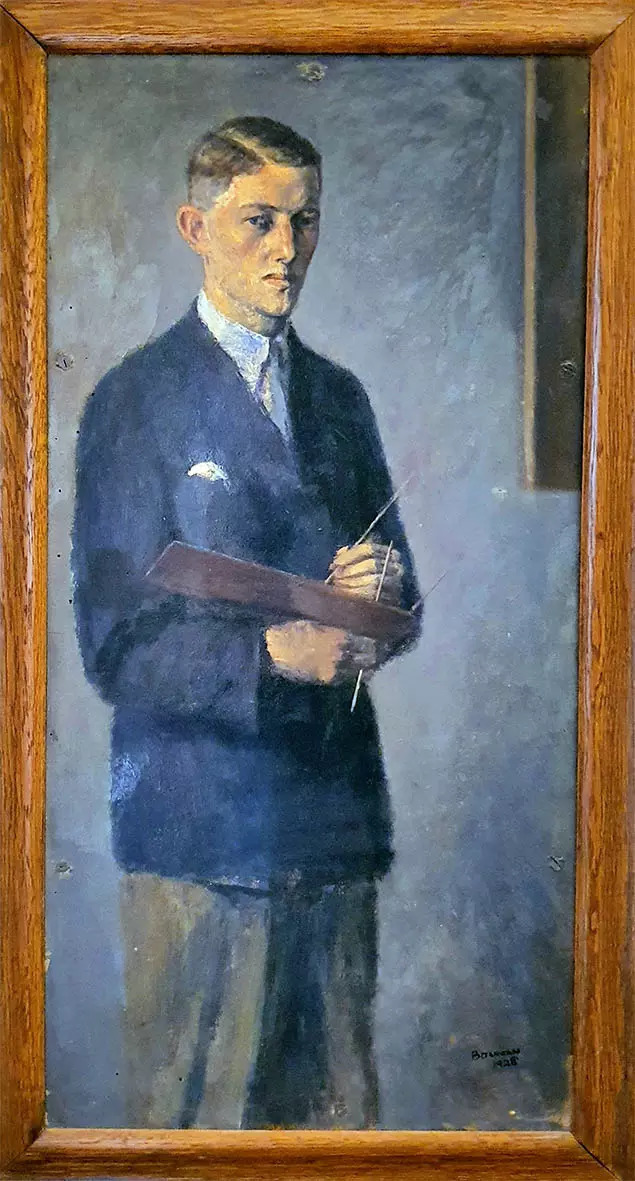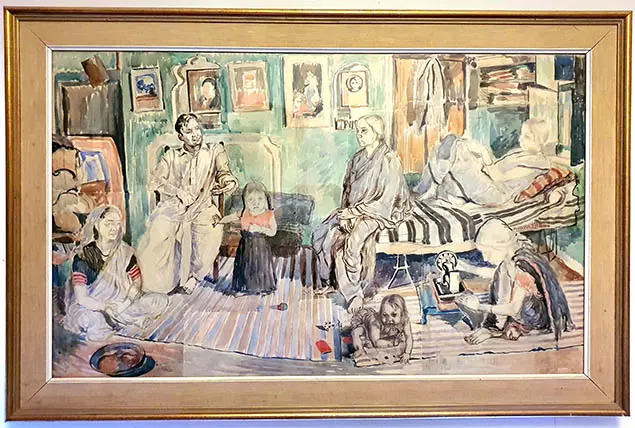Clive Branson
This is a collection of articles archived for the excellence of their content. Additional information may please be sent as messages to the Facebook community, Indpaedia.com. All information used will be gratefully acknowledged in your name.
This is a collection of articles archived for the excellence of their content. |
A brief biography
Abhilash Gaur, February 21, 2022: The Times of India

From: Abhilash Gaur, February 21, 2022: The Times of India

From: Abhilash Gaur, February 21, 2022: The Times of India

From: Abhilash Gaur, February 21, 2022: The Times of India
It’s February 1943. The Japanese are advancing on India from the east and the country is in the middle of the Quit India Movement. Not the best time to be a white sahib in India, but an English soldier camping in Karwar, Karnataka, is winning hearts.
He’s a poet and painter, and visits the local school one day to talk to the children about Wordsworth’s poetry. One of the boys asks him, “Britain has ruled India for 150 years – if India conquered Britain, how long would it rule?”
Instead of being annoyed, the soldier is impressed. “The brightness and intelligence of these children is splendid,” he writes in a letter to his wife Noreen.
It’s not the first time he has expressed his admiration for Indians to her. While based in Gulunche near Pune, he sees women making a road, and writes: “What dignity the women labourers here in India give to the very primitive making of a country lane.”
Who is this man, so out of character with India’s British masters? His name is Clive Branson. Born to a British army officer in Ahmednagar in 1907, he has returned to the country after 35 years.
While in India, Branson writes many letters to Noreen. They are published as the book ‘British Soldier in India’ after his death in 1944, and it’s through them we know his views about India.
Sensitive to suffering
Almost the first thing Branson does on arrival in Bombay, in May 1942, is search for a book on Hindi. Then, on the road to Gulunche near Pune he sees how poor most Indians are and writes: “After 175 years of imperialism in India, the conditions are a howling disgrace.”
Later, while based in Dhond, he expresses the same feelings in stronger words: “However much people at home believe in British imperialism, there are 400 million (Indians) who know by bitter daily experience the reality.”
As ‘rations corporal’ of the Gulunche camp, he goes to town daily to buy provisions, and uses the outings as an opportunity to make friends with the locals and learn Marathi. But in the camp, he has to tolerate the older soldiers who are hostile to Indians. Branson calls them “bloody idiots” and writes he is ashamed to think of himself as one of them.
When riots break out after the arrest of Congress leaders at the start of the Quit India Movement, the troops at Gulunche are sent out on law and order duty, but Branson avoids it because he regards it as “warfare against the people”.
His sympathies are with the Indian rioters: “Even though one does not agree with what the people are doing, one understands why they do it.”
He is a communist who has fought in the Spanish Civil War and spent time in a concentration camp. A keen observer of politics, he mocks the British Labour Party for urging the Congress leaders to call off the movement.
“How brilliant! doesn’t the Labour Party know that the Congress leaders are in jail, and that is why the rioting is going on – anarchistic because without leadership?”
Likewise, when British Prime Minister Winston Churchill implies in a speech that the riots in India are a Congress conspiracy to help the Japanese, Branson writes: “Churchill’s speech on India was just filth.”
When a soldier at the camp tells him he is lowering ‘white prestige’ by being friendly with the Indian tea and fruit sellers, Branson retorts: “The fact that white sahibs go into cheap brothels with native women must do much to uphold this prestige.” He can’t stand the condescending manner Englishmen assume towards Indians. He tells Noreen: “When this war is over, we must come back to India as civilised friends.” In another letter he says: “I know I shall want to come back to India, where I can feel I am with humanity and not just one of a stuck-up little part of it.” One night, he loses his cool when white officers hit and shout at a young Indian. “I am certain I shall not end my tour of duty in the army in India without getting into some trouble through sticking up for the Indians. But I know who is right,” he writes.
Politically conscious Branson’s letters also record interesting political events in India. For example, his letter of September 26, 1942 mentions a campaign in Gujarat’s Kaira district (home to Amul) to collect 1 lakh signatures from 700 villages to demand the release of Congress leaders from jail. When the British propaganda machinery tries to tar the image of student protesters with a rumour that some of them have raped a woman, Branson writes: “fancy Congress students demonstrating for the release of Nehru by raping women.” The poverty of the country pains him. “A journey through this country is indeed painful – there is such a vast mass of human happiness, human intelligence, gone to waste.” So when an officer asks him to paint scenes from army life, he writes: “If I paint at all, I want to paint the Indians...my conception of life is my conception of painting. I don’t paint things I want to forget.” At the end of 1942, when Bombay is gripped by food shortage and workers are spending up to eight hours a day in food queues, Branson feels depressed at his inability to do anything to meet the “huge situation… so little able to atone for the stinking, filthy, crooked, hypocritical bastards of so-called Englishmen who rule this great country.”
The seaside break in Karwar in 1943 is a pleasant interlude on his tour. “I shall never forget these fishermen, these peasants, these children and their little town,” he tells Noreen. But he doesn’t know he has only a year left to live. On February 25, 1944 he is killed while fighting the Japanese in Burma. It has been 78 years.
Some wanted his book banned
When the British Communist Party published ‘British Soldier in India’, in 1944, some officials of the British government recommended a temporary ban on it, possibly because the World War was still on. However, PN Thapar, secretary in the information & broadcasting department, noted on the file on September 8, 1944: “It should not be banned without consulting the secretary of state. There would be no point in banning if it received good publicity and reviews in the British press which will eventually find its way into India.”